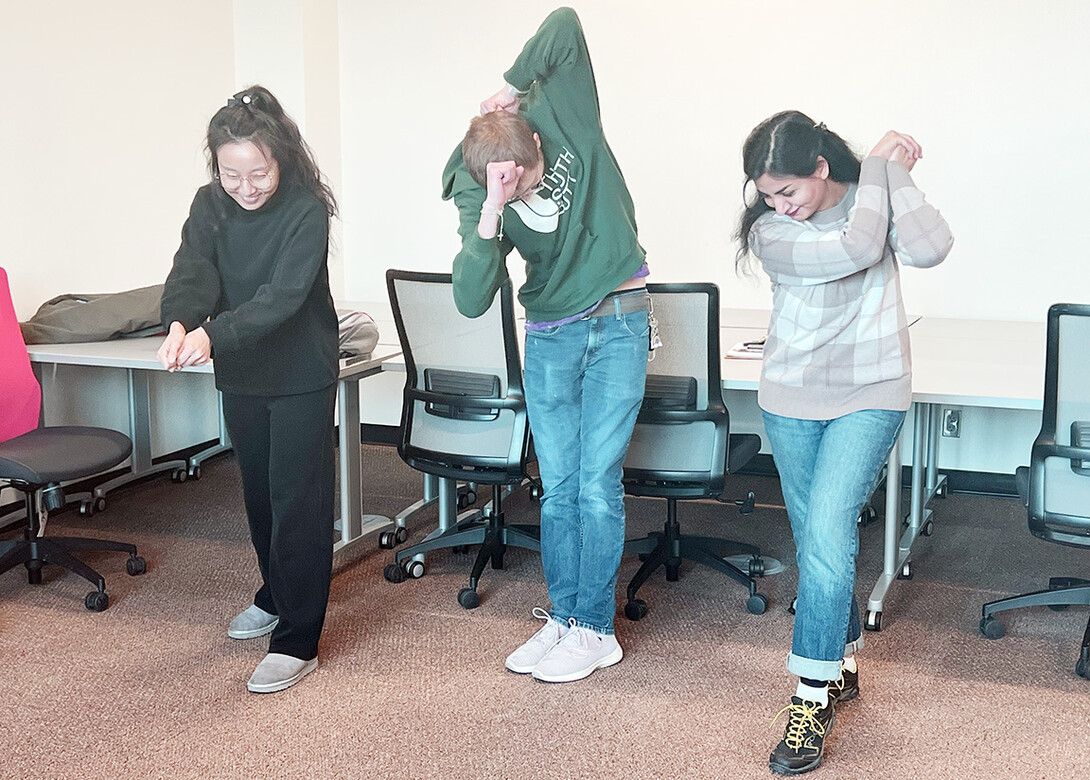
They built elaborate machines piece by piece, 12 people adding their creative touches one after another. Some pieces complemented the work done by teammates who had already contributed to the design, while others didn’t seem to make sense.
After the final piece was added, they each looked around the Peter Kiewit Institute classroom on Scott Campus in Omaha to see how the machine was functioning. Then, and only then, did they determine just what it was they had created — a gas-powered, water-cooled contraption that would mass produce and package toasted bread and deliver it via a large bird.
Nothing about it was a typical process for this group of Nebraska Engineering faculty and graduate students and a research scientist from Boys Town.
It was, however, a vital communications lesson as part of a one-credit class, ENGR 491/891, “Improvisation Skills for the Complete Engineer,” which was offered during the three-week spring pre-session in January.
Intended for College of Engineering graduate students in both Lincoln and Omaha, the class teaches outside-the-box communication skills that can help engineers prepare for success in academia, industry or research, said Lily Wang, director of the Durham School of Architectural Engineering and Construction.
On the final day, Soumitra Das, a master’s degree student in construction engineering, readily volunteered for an exercise that put three people in front of the class awaiting prompts. Class members then suggested the setting (a food court) and an activity (riding go-carts). Instructor Doug Rothgeb suggested emotions that were assigned to each of the participants.
And … action, followed by nervous gasps, giggles, uneasy tension and applause from both the performers and the rest of the class.
Das admitted he was nervous being part of that exercise and that this is typical when he talks in front of groups, even about his work or research. That, Das said, was a big reason to take the improv class.
“I thought maybe there are some skills that I was lacking and they could teach me some tricks, but it’s not magic,” Das said. “(This class) helped me to learn how to get comfortable up there, how to get better in my presentations and preparing for my defense or for whatever might happen in a work environment.”
To make the class come to fruition, Wang enlisted Rothgeb, artistic director for Omaha improv group Big Canvas. He taught and helped to design the first class, which was offered by the College of Engineering in Omaha for the January 2022 pre-session.
In 2023, the class was offered on both of the college’s campuses. Rothgeb taught the section in Omaha this year along with Iason Konstantzos, assistant professor in the Durham School, while the Lincoln session was taught by Julie Uribe, a lecturer in the Hixson-Lied College of Fine and Performing Arts and an Emmy Award-winning producer.
From the first assignment of the pre-session — students each talking for five minutes into a computer camera about their work and research — to their final two-minute presentations on the same topic, Rothgeb said there was plenty of growth in only 17 days
“You could see the confidence grow, tenfold in three or four of them. Their heads are up, they’re speaking louder, they’re standing still, they’re looking at everybody, and it seems there’s a little more confidence,” Rothgeb said. “They’ve gone from really enclosed and speaking very softly to standing up front and going, ‘this is what I’m doing, this is how I’m doing it, and this is how I got here.’ “
Just as the students’ communication skills evolved, so has the class, Rothgeb said.
“About halfway through last year’s class, we realized they were looking at their work in one dimension — as just work and projects, not with a human factor or a playful factor or a teamwork factor,” Rothgeb said. “We added some different dynamics this year, so they can see that they’re not only doing the work, but they’re selling the work and themselves.”
Since taking part in an improv workshop as part of the 2018 NU SciComm conference while an associate dean of the college, Wang had been looking for a way to offer these skills to engineering students.
Upon becoming director of the Durham School in July 2021, and with three-week sessions instituted during the 2021-22 winter break, Wang saw an opportunity to give an improv class a try.
“In improv, they say you jump without a parachute and take it from there, and that’s sort of how we did it,” Wang said. “This class was one of the first big things I did as Durham director and nobody knew how or if it would succeed, but it turned out to be everything I could have hoped for.”
Wang said there’s hope that the improv class could evolve into something bigger down the road.
“There is room to grow. I do believe this would be a great experience for all of our engineering students and it fits really well with the college’s Complete Engineer program. So, we’ll keep seeding this and hope that more students on campus will recognize the benefits of learning improv skills.”







